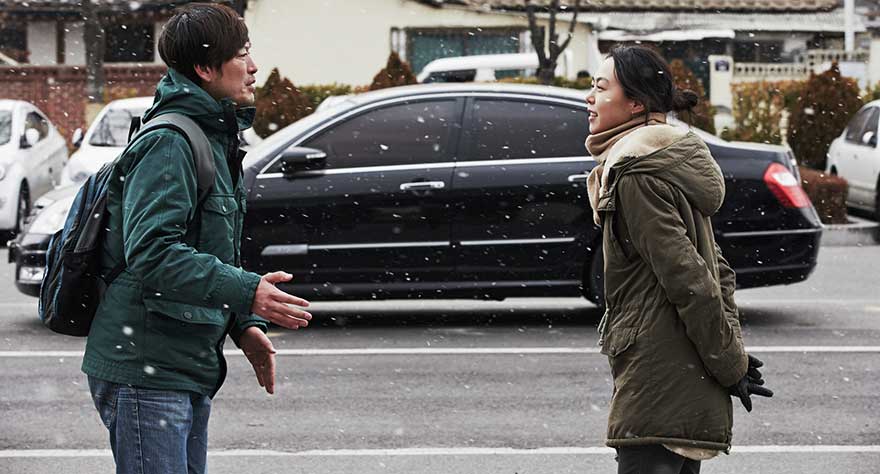
Another formally playful Hong Sang-Soo film about love and (foolish) directors, but this time the results aren't as successful.

Another formally playful Hong Sang-Soo film about love and (foolish) directors, but this time the results aren't as successful.
Now on his 17th feature, Hong Sang-soo has created yet another story about film directors, the women they pine over, and lots of soju. Hong’s films tend to play out in a similar fashion, to the point where it wouldn’t be unreasonable to claim he’s been remaking the same film for most of his career. But it would be unfair to dismiss Hong’s work as one-note, due to his tendency of experimenting with form. Stories can repeat themselves, the laws of time and space break in two, and stories can reflect and refract within themselves. This playing with form can suddenly turn what appears to be a flighty effort into something more substantial; it makes Hong’s common themes of love and regret more resonant as a result. Right Now, Wrong Then sees Hong continuing to do what he knows best, although the results are lacking compared to some of his more recent fare.
Those familiar with Hong’s work shouldn’t be surprised by the plot. Director Ham Chunsu (Jung Jae-young) comes to the city of Suwon to present one of his films at a local festival, but he arrives a day early due to a miscommunication. With nothing to do, he wanders the city, eventually bumping into Yoon Heejung (Kim Min-hee), a young woman Chunsu quickly falls for. Chunsu quickly sweet talks Heejung into joining him for a coffee, and the two wind up spending the entire day together. Chunsu comes across as a bit of an egotistical person (it doesn’t help that almost everyone in the film heaps praise on him and his work), and after drinking too much as a sushi bar, he starts being a lot more explicit to Heejung about his feelings for her. Things eventually go sour, though, once Heejung takes Chunsu to her friend’s, and they expose Chunsu’s womanizing ways. Heejung, devasted to learn that her new friend is actually married, abruptly leaves, and Chunsu winds up flipping out the next day at his screening’s Q&A.
At that point, Right Now, Wrong Then literally resets itself. Now with a proper title card (the film’s first half opened with the title Right Then, Wrong Now), the day starts over, and Chunsu’s meet up with Heejung plays out with a few slight differences that increase exponentially as the day goes on. By making the second half of the film a slight variation on the first, the focus on the film changes significantly; with the general frame and story already known, attention goes to the smaller details to find changes between each part. By contextualizing every interaction, camera movement, and line of dialogue down to a micro level, Hong emphasizes the importance of how these seemingly small elements can shape the way people behave and interact. Pay enough attention to Right Then, Wrong Now and Right Now, Wrong Then, and there will be small rewards, whether it’s events or statements that can suddenly change the meaning of an action or line portrayed before.
But does Hong’s film really work at what it’s going for? In this case, not really. Unlike the three-part narrative of In Another Country, the Groundhog Day-esque repetition of The Day He Arrives, or the jumbled narrative of Hill of Freedom, the repeated halves simply don’t have much to delve into, and with the film’s two-hour runtime, things drag significantly once Hong’s point establishes itself. Hong’s low-key humour and dry comedy also feel sorely missed here (or, perhaps, it was too subdued for me to find it effective), with a lot of the film amounting to watching characters have rather dull conversations. It’s all disappointingly stale for Hong, especially after his highly entertaining Hill of Freedom last year. By now, Hong has shown that his variations on the same story can lead to some truly funny and thought-provoking material; Right Now, Wrong Then feels more like a slight misstep than anything else for Hong. There’s no sign that he’s lost his touch, but in this case, his experiment is less successful than his previous ones.